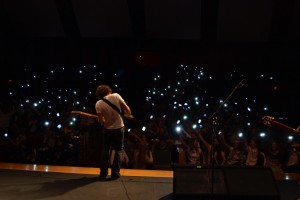Hello folks! Heading out on the I-40E today from Nashville to play a couple of month’s worth of shows around the Midwest and discuss financial equality. The coffee is hot, the skies are gray and beautiful, and the band is rehearsed and ready for battle.
Here are the four questions I am most often asked about why we are traveling the country and going school to school performing and talk about financial literacy.
The best books I have read on this are How the Poor Can Save Capitalism and The Memo by the fabulous John Hope Bryant. They are succinct, clear-eyed, and passion-fueled road maps for creating financial equality across the country.
1. What do rock ’n’ roll and financial literacy possibly have to do with each other? Why a rock band?
Financial literacy is empowerment and freedom. This knowledge can provide new hope to young people once they understand some very basic things that are seldom explained in school (only 16% of High Schools even talk about this issue in the curriculum). To have control over your own life is very “rock ’n’ roll” to me. Without a basic understanding of credit, interest, saving, and creating a rainy day fund (which will keep kids who are struggling away from predatory lenders), there is no way to turn our communities around. To me, it’s “rock ’n’ roll” to have the freedom to make your own choices, to build the kind of life you want to live, and most of all, it’s “rock ’n’ roll” to help others. This planet needs fully aware, fully educated young people who are gonna make this place work for everyone. A rising tide lifts all boats.
2. What is the worst money mistake you made growing up?
Other than a mistaken mindset that getting famous fixes all your problems, it was getting in trouble with credit cards. I didn’t understand that at 25 percent interest, a fourth of every hour I worked went to someone else and hurt my ability to build my own life and career. I also missed minimum payments, and when I needed a loan the most, my credit score was too low.
3. When did you start saving?
In my late 20s. Much, much later than I should have. I never understood the power of compounding interest til I had lost a lot of year- and time is the power that makes money work. I have worked almost every day of my life, but if I had saved along the way, I would have gotten so much further so much faster. It’s important to remember that people who struggle may be working very, very hard, but if they don’t have money saved, their money cannot work for them. I also had a lot of guilt about having money since I was raised around the idea that having too much makes you cruel somehow, vs. my belief now that seizing independence and wealth can allow you to fight for others who need and desperately deserve a helping hand. Like everything, it’s about our hearts as much as our heads.
4. What inspired you to do this?
Some of my closest family members and friends have faced huge struggles with money, and I have seen how quickly it can tear families, relationships, and communities apart, especially after the last financial crash. I also commiserate with young people who think that their “only way out” is being famous, getting a sports deal or record contract. Music saved my life, but I was never taught to save some money along the way. Not at home or in school. Our society really doesn’t reward “slow and steady” in any area. Everything is based on more and now. Immediate gratification. Also, as a touring rock band, we have seen firsthand that the roughest streets are the ones with five or 10 same-day lenders setting up shop. This creates a feedback loop that makes it very hard for people already having financial trouble to ever get a foothold. We have talked to these people in the middle of the night after our shows, and we figure if we are lucky enough to have a microphone to speak out, we might as well use it.
—Gooding
Subscribe to our RSS feed: http://goodingmusic.com/blog/feed/


